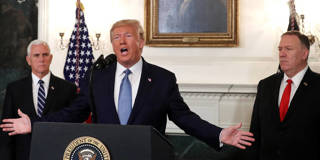Following its targeted killing of Iran's second most powerful leader, the US could well find itself with no alternative but to devote more military resources to the Middle East, a path that could lead to additional Iranian provocations. And that shift would occur at a time of growing challenges to US interests elsewhere in the world.
NEW YORK – The United States emerged from the Cold War some three decades ago possessing a historically unprecedented degree of absolute and relative power. What is baffling, and what will surely leave future historians scratching their heads, is why a series of US presidents decided to devote so much of this power to the Middle East and, indeed, squander so much of America’s might on the region.
This pattern can be traced back to George W. Bush’s war of choice against Iraq in 2003. The US did not need to go to war there at that moment; other options for containing Saddam Hussein were available and to a large extent already in place. But in the aftermath of the September 11, 2001, terrorist attacks, Bush decided that he must act, whether to prevent Saddam’s development and use of weapons of mass destruction, to signal that America was no helpless giant, to trigger a region-wide democratic transformation, or some combination of the above.
His successor, Barack Obama, entered office determined to reduce American involvement in the region. Obama removed US troops from Iraq and, although he initially increased the number of US troops in Afghanistan, set a timetable for their withdrawal. The big strategic idea of his administration was “rebalancing”: US foreign policy should de-emphasize the Middle East and focus more on Asia, the principal theater in which the world’s trajectory in the new century would be decided.

NEW YORK – The United States emerged from the Cold War some three decades ago possessing a historically unprecedented degree of absolute and relative power. What is baffling, and what will surely leave future historians scratching their heads, is why a series of US presidents decided to devote so much of this power to the Middle East and, indeed, squander so much of America’s might on the region.
This pattern can be traced back to George W. Bush’s war of choice against Iraq in 2003. The US did not need to go to war there at that moment; other options for containing Saddam Hussein were available and to a large extent already in place. But in the aftermath of the September 11, 2001, terrorist attacks, Bush decided that he must act, whether to prevent Saddam’s development and use of weapons of mass destruction, to signal that America was no helpless giant, to trigger a region-wide democratic transformation, or some combination of the above.
His successor, Barack Obama, entered office determined to reduce American involvement in the region. Obama removed US troops from Iraq and, although he initially increased the number of US troops in Afghanistan, set a timetable for their withdrawal. The big strategic idea of his administration was “rebalancing”: US foreign policy should de-emphasize the Middle East and focus more on Asia, the principal theater in which the world’s trajectory in the new century would be decided.